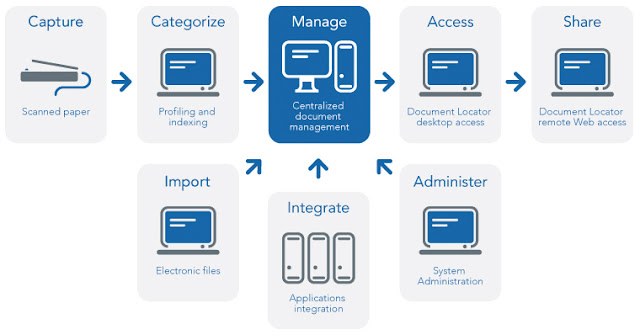 |
| Manage Your Documents in Windows - Ankit Nama Blog |
After much research and analysis , we use Windows business as the best
document management system FileHold recommend. We believed we FileHold
document management system selected from a pool of dozens . Our whole
methodology and document management systems to read for a more extensive
list .
FileHold specially designed with Windows in mind. Software, which is
loaded with impressive features, such as Windows Explorer uses the same
file structure. This system is easy to adjust for staff creates. What
makes the Windows computer using FileHold is appealing for small
businesses that look the same and they are already accustomed to the
feel of the programs that is. Filing structure the cabinet, drawer,
folder and subfolder approach that incorporates Windows uses. Once
installed, employees quickly get up to speed on how to use and navigate
the system should be able to.
We were impressed with the system's clean interface. Other systems that
are cluttered with icons and images, as opposed to, all you see when you
log in the left hand side of the page below the search bar on the top
of the document library. Filing, search and all documents are reviewed
by the same page. Many of the other systems we examined force you to
toggle back and forth between pages, depending on what you are working
on.
We found to be extremely useful to system folders MyFileHold. These
different cabinets and "preferred" documents, their checking - out
files, drawers for alerts or reminders they are folders located on top
of the general library, they recently accessed files and documents they
recently added to the system . This document is currently being worked
on and items that need immediate attention provides a quick snapshot.
1. Manage Files and Folders with File Explorer
Using your Windows 10 system to create information. Over time, we
accumulated a lot of files stored on our hard disk. How Windows 10 (and
in general Windows) This is an important part of a file system that
manages how the files are stored and accessed on your computer is using.
Part you and I, we like when we document files, audio files, as our
computers, create, interact with, and the video file manager. This file
is in the Windows Explorer. Over the years, this essential part of the
Windows experience, quick release, in the Windows Explorer file manager
has evolved from its roots as a file explorer and now for the first time
was introduced in Windows 8 called.
 |
| Manage Files and Folders with File Explorer - Ankit Nama Blog |
2. Using File Explorer in Windows 10
Click to view the files stored on your computer Explorer icon on your taskbar or Start> click File Explorer.
When you launch File Explorer in Windows 10, you are presented within the Quick Access window. Formally called favorites in previous versions of Windows; Here you most frequently accessed folders and you will see the files created.
File Explorer is used for a variety of tasks, management and organization of files and folders in addition, also such internal, attached storage, and optical drive of your computer for viewing and resources is used to manage.
When you launch File Explorer in Windows 10, you are presented within the Quick Access window. Formally called favorites in previous versions of Windows; Here you most frequently accessed folders and you will see the files created.
File Explorer is used for a variety of tasks, management and organization of files and folders in addition, also such internal, attached storage, and optical drive of your computer for viewing and resources is used to manage.
 |
| Ankit Nama Blog |
3. User Folder
Windows 7 and earlier versions, you can store a user folder directory
and such documents, audio files, pictures, video and other types of data
such as content into folders to organize your files was used. Some of
these folders can still be accessed from the PC. Other folders that your
user folder created by third-party applications can be part of the
bread crumb menu can be accessed from within your user directory.
To do this, click the arrow in the address bar (see above) and you click your account name represented by the Users folder. Or, press key + R, then type:% userprofile% and hit enter.
To do this, click the arrow in the address bar (see above) and you click your account name represented by the Users folder. Or, press key + R, then type:% userprofile% and hit enter.
 | |
| Ankit Nama Blog |
4. Change how Files are Displayed in Windows 10 File Explorer
See how you can change the file using the View tab. When you activate
this tab, you windows, files, change the layout of the current scene or
view the various groups will hide a few things you see on the screen.
Layout within the group, click one of the options available, how your
files are displayed on the screen to change. You also confirmed by a
hovering of the available options before you can preview the layout.
5. Go Back to a Previous Folder
If you want to navigate to the previous folder, you can either
efficiently or bread crumb Recent Locations button menu a couple of ways
you can use.
 |
| Ankit Nama Blog |
Recent Locations menu, you click, you return quickly to a previously working directory along the way can go without going through multiple directories.
Bread Crumb Menu introduced similar capabilities in Windows Vista, for example, you can easily navigate to a folder with a folder path can offer. So, if there are sub-folders within a folder, you can quickly jump to any folder within that path now.
6. Organizing Files and Folders
Windows 10 system files on your computer a lot, you'll want to organize
them. So if you have made recent files or files need to see old or
certain files need to be stored elsewhere, you can do so easily. View
tab sorting options for how files are displayed provides. Here, I have
chosen to settle my files by type. When I select this view, I can see
all your Microsoft Word and Excel documents and workbooks.
 |
| Organizing Files and Folders - Ankit Nama Blog |
7. Copy, Pasting a File or Folder
A copy of the most common operations for users who creates a replica of
the original file. To copy a file, you copy the file to the Home tab,
click Copy to.
You can just as easily copy or move a file without leaving your current location can. Organize within the group under the Home tab, click Copy or move buttons and is listed, select the location or select the location button and select the location.
You can just as easily copy or move a file without leaving your current location can. Organize within the group under the Home tab, click Copy or move buttons and is listed, select the location or select the location button and select the location.
No comments:
Post a Comment